News and Announcements
Welcoming the 2024 Smart Justice Spark Grant Community Advisors
Published Date
- October 16, 2024
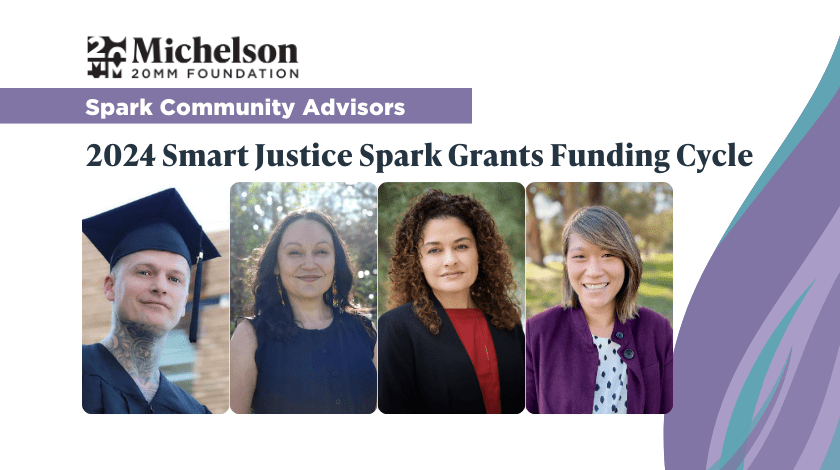
Join us in welcoming Ryan Flaco Rising, Alejandra Gutierrez, Azucena Wood Hardesty, and Gail Yen, the 2024 Smart Justice Spark Grant Community Advisors!
This year, the Smart Justice funding cycle embodies a multi-pronged approach so that multiple populations impacted by the justice system benefit from targeted support. The advisors will actively ensure that our efforts benefit systems-impacted women, children, and those reentering their communities.
Funding projects that scale higher education and workforce development programming for incarcerated women is crucial for fostering sustainable change and reducing recidivism. By implementing gender-responsive curricula and increasing vocational training opportunities in high-demand fields, we can equip these women with the skills needed to thrive post-release, enhancing their employment prospects and contributing to safer communities.
Additionally, supporting multigenerational programming for their children helps break the cycle of incarceration by addressing trauma and maintaining parent-child bonds, while mentorship initiatives promote college access and success. Safeguarding continuity in education during and after incarceration is essential for retention and completion. By partnering with employers to create equitable job opportunities, we can challenge the stigma surrounding systems-impacted individuals.
Focus Areas of the Smart Justice Funding Cycle
We opened the funding cycle from September 3rd – 17th, 2024. During that time, we welcomed proposals in support of the following focus areas:
- Efforts that scale and increase higher education and workforce development programming for incarcerated women. Projects should improve post-release opportunities and reduce recidivism, which can include but is not limited to:
- Implementing and scaling gender-responsive curricula that address the unique needs and challenges faced by incarcerated women.
- Increasing vocational training opportunities in high-demand fields, ensuring that women gain skills that are relevant to the current job market.
- Incorporating life skills training, including financial literacy, parenting, and relationship management.
- Establishing ongoing partnerships and memorandums with educational institutions and employers to facilitate gender-specific post-release education and employment opportunities.
- Incorporating counseling, mentorship, and other support services to address issues such as trauma, substance abuse, and mental health as part of the educational curricula.
- Multigenerational programming that supports the children of incarcerated individuals and prevents the school-to-prison pipeline. Efforts can include but are not limited to:
- Addressing trauma and mental health needs of children of incarcerated parents.
- Maintaining the parent/child bond during incarceration.
- Supporting the caregivers/guardians of the children of incarcerated parents.
- Offering mentorship programs geared toward college access and success for students with incarcerated parents.
- Providing workforce development opportunities for youth and young adults with incarcerated parents.
- Efforts focused on increasing higher education retention and completion rates for individuals in prison and individuals being released from prison, which includes:
- Bridging support during a person’s release from prison to ensure continuity and completion of a person’s higher education journey.
- Leveraging the talent and experience of incarcerated graduates in ongoing higher education in prison programs.
- Creating paid tutoring, mentoring, fellowship, and research opportunities for higher education in prison program alumni.
- Workforce development efforts focused on engaging, educating, and partnering with employers to create job opportunities for systems-impacted individuals.
- Reducing the stigma of hiring systems impacted individuals.
- Creating more streamlined and equitable hiring practices that open the door for onboarding systems impacted individuals.
Meet the 2024 Spark Community Advisors
Please join us in getting to know the four individuals whose lived experience and dedication to advancing equity in the justice system will help guarantee the funded projects help justice-impacted individuals.
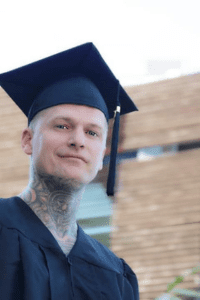 Ryan Flaco Rising
Ryan Flaco Rising
Formerly Incarcerated System Impacted Peer Educator, UCI Transfer Student Center
Ryan Flaco Rising is the founder of the West Coast Credible Messengers Program, as well as a PhD student in Criminology Law and Society at the University of California, Irvine. His lived experience as a formerly incarcerated gang-involved youth and adult deeply informs the work he does around assisting formerly incarcerated students and gang-involved individuals in their transition into the UC system, bringing to the table a unique first-hand perspective.
Flaco Rising’s research interests center on creating pathways for formerly incarcerated and gang-involved individuals into higher education and analyzing the evolution of programs that serve formerly incarcerated students within the university system. He has been a part of the Underground Scholars program since his release from New Folsom State Prison in 2015. Flaco Rising founded the Gaucho Underground Scholars Program at the University of California, Santa Barbara while completing his bachelor’s degree in sociology with a minor in education. There, he played a critical role in the leadership and statewide expansion of the Underground Scholars Programs, now active on almost every University of California campus.
Having won many prestigious awards, his writing has been published in a variety of newspapers, as well as in the book Reclaiming Our Stories. Flaco Rising’s work is a testament to the power of formerly incarcerated students.
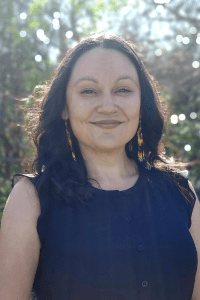 Alejandra Gutierrez
Alejandra Gutierrez
Policy Attorney, Youth Law Center
For over a decade, Alejandra Gutierrez has focused on ending the criminalization of children and youth of color through community organizing, movement-building, and policy advocacy. Her dedication as a child and youth advocate is largely rooted in her experiences growing up in Coachella, a small community in California’s Inland Empire. Gutierrez is a Xicana, first-generation attorney working with the National Center for Youth Law’s (NCYL) Youth Justice Team.
Gutierrez aims to create alternatives to system involvement and incarceration by helping to strengthen community-led and healing-centered approaches. She does this by building authentic partnerships with families, community-based organizations, and other stakeholders to amplify youth and community leadership in local and state policy advocacy efforts. Gutierrez’s regions of focus are the Central Valley and Inland Empire.
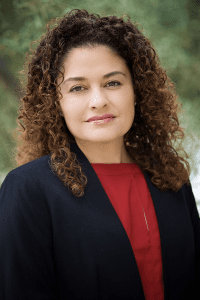 Azucena Wood Hardesty
Azucena Wood Hardesty
Coordinator, San Diego State University (SDSU) Valuing Incarcerated Scholars through Academia (VISTA)
As the SDSU VISTA Program Coordinator, Azucena Wood Hardesty provides academic and administrative assistance to students and prospects. She holds a Bachelor’s in Child Development from Point Loma Nazarene University, Master of Arts in Education with a Counseling Concentration, and Graduate Certificate in Restorative Justice Practices and Trauma-Informed Care from SDSU.
Wood Hardesty possesses a holistic understanding of student needs, particularly in mental health and academic realms. Her experience in psychiatry at SDSU Student Health Services has equipped her to offer effective care to students grappling with mental health challenges. Wood Hardesty is committed to expanding her skill set to better serve incarcerated students, driven by her passion for ensuring equitable opportunities for all in higher education. She also aspires to cultivate an inclusive and supportive academic environment where every student can flourish both academically and personally.
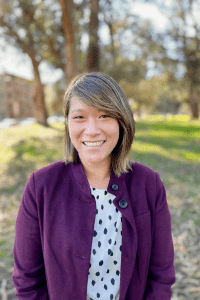 Gail Yen
Gail Yen
Program Officer, California Wellness Foundation
Gail Yen is a Program Officer at the California Wellness Foundation. Previously, Yen was the policy director at Root & Rebound where she ensured formerly incarcerated people have successful reentry journeys. She also worked on reforming higher education policies at California Competes, and health policies at Children Now. Yen is a child of immigrants and a former foster youth.
We are immensely grateful for their guidance and look forward to sharing the 2024 Smart Justice Spark Grantees!
Michelson 20MM is a private, nonprofit foundation working toward equity for underserved and historically underrepresented communities by expanding access to educational and employment opportunities, increasing affordability of educational programs, and ensuring the necessary supports are in place for individuals to thrive. To do so, we work in the following verticals: Digital Equity, Intellectual Property, Smart Justice, Student Basic Needs, and Open Educational Resources (OER). Co-chaired and funded by Alya and Gary Michelson, Michelson 20MM is part of the Michelson Philanthropies network of foundations.
To sign up for our newsletter, click here.